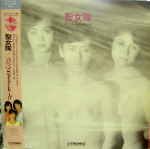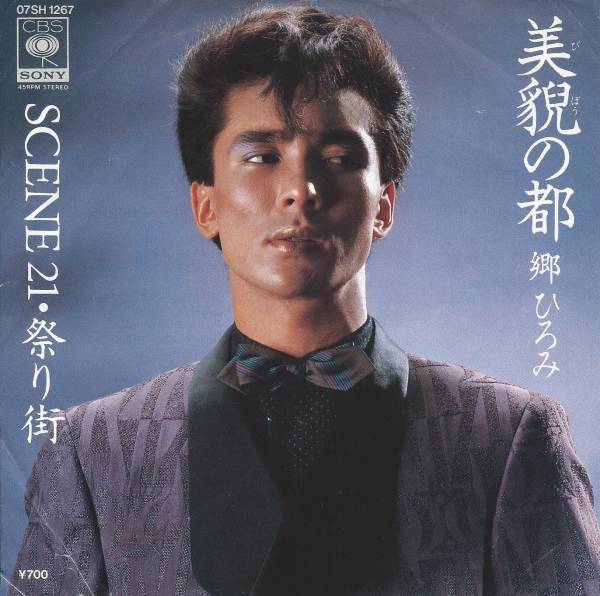 | Hiromi Go - Bibou no Miyako | Hiromi Go: a super-entertainer that Japan is proud of. Despite being, well, Hiromi Go, he, astonishingly, also had magnificent techno kayou: Bibou no Miyako! Which, people from recent years might not be familiar with. Furthermore, the composer, Kohi Tsutsumi, and arranger, Ryuichi Sakamoto, are said to be a strong writing team. Anyway, Hiromi Go was a thorough entertainer: once the Latin boom came he sung Goldfinger '99, a cover of Livin' La Vida Loca', and the public decided he claimed the subject entirely for himself; and, during the time of the technopop boom, the entire YMO family participated in and finished producing the album Hiromi Kyo no Hanzai which was, in fact, gratuitously luxurious. Even up to the cosmetics used in the jacket picture, everything about it is excessively '80s. | 1983; 07SH1267 |
 | Starbow - Hatobureiku taiyo-zoku | Aliens that came from another planet (thus, they cannot talk in earth languages!).
Starbow, whose music was drawn from the stream of mid-period YMO, were considered an absurd creation and received high appraisal for their debut single from cult-fans, technopop maniacs and B-class idol maniacs. Matsumoto and Hosono of Happy End combined using the raw materials of idol music in order to cook the ultimate delicacy: a concept called 'Technopop from Aliens of the 10th planet!' The B-side, Tokyo Bay Blues, is famous (forgotten) music that also possesses a wonderful floating feeling. After their first album was released, Starbow took an orthodox idol route; however, nobody took notice of earthlings with mere average looks. In recent years, their only album has miraculously been re-issued on CD. | 1982; 7DX1325 |
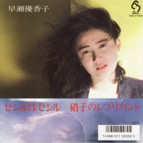 | Yukako Hayase - Garasu no Replicant | Yukako Hayase's second single is sung in a much faster whispered, tired, French voice than Kamihi Karie.
Since this was aimed at becoming a hit single, the album contains a taste of a high degree of different synths. This version of the song was originally unreleased on album, although later became so on CD.
The title of the song, Garasu no Replicant, refers to the androids in the science fiction film Blade Runner, and the lyrics, by Izumi Asato, also have a futuristic feel about them.
Yasushi Akimoto's stylish lyrics for the B-side, Seshiru wa Seshiru, can be reminiscent of Yapoos' Seshiru Katto.
There is another album of Yukako Hayase called Polyester which was entirely produced by Seiji Toda. | 1986; 7SS-5 |
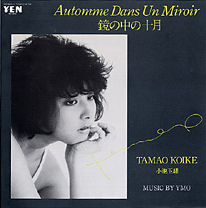 | Tamao Koike - Kagami No Naka No Zyugatsu | Previously a model, Tamao Koike is a famous singer of French-influenced techno kayou and was a backing singer for YMO. Among the YMO-related items, some are not available at market, and, with the exception of French taste that is currently valued highly, are difficult to obtain. The B-side, Automne Dans Un Miroir, is an alternative version of the A-Side, Kagami No Naka No Zyugatsu, and is sung in the French language. While YMO is managing, it is strange that now it has not received much attention, though it can be seen that the audience of the time sought it and proof of it is that they were open to the musical-direction of each member and, consequently, passed through. Well then, as for Alfa, the cover of Telex, L'amour Toujours, by Miharu Koshi is also an excellent song in the French language.Translator's note: I definitely need to have another look at this one. | 1983; YLR-708 |
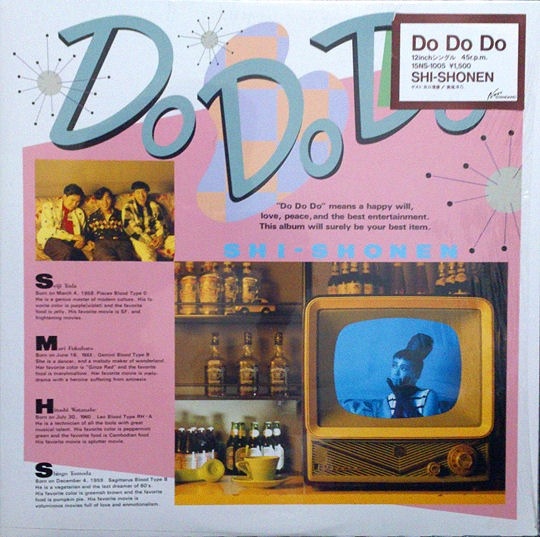 | Shi-Shonen - Do Do Do | This 12", Do Do Do, follows Shi-Shonen's first album, Singing Circuit. Furthermore, unlike their previous work, Shi-Shonen thoroughly transitioned into oldies-technopop, right up to their album's jacket --which contains commentary of western music, particularly from the '50s and '60s. This album is a natural consequence of Seiji Toda: ranked with those EPs from an older era; I am keenly obsessed with his pop music. | 1985; 15NS-1005 |
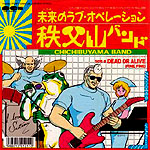 | Chichibuyama Band - Mirai no Rabu Operation | Chichibuyama Band is, astonishingly, a unit of Keiichi Suzuki of Moonriders and Kera of Uchoten. They performed the background music for Doctor Chichibuyama Corner of Fuji TV's "All Night Fuji". Although the arrangement contains 0 technopop-like elements, it is a luxury that is called the meeting of (at the time) new and old new wave bands. However, I think that to look at just a single side of the essence of techno kayou and do not believe for certain that it was created in spirit only.* I can sense the era that the music is from in the B-side which is titled "DEAD OR ALIVE". *This segment was hard to translate; it included a word, Sabire, which was written in Katakana and I could not find a definition for it at all, and I don't think it is the title of any of Moonriders' or Uchoten's songs. I'll attempt to go over it later, but, right now, I'm short on time. | 1988; 7A0863 |






